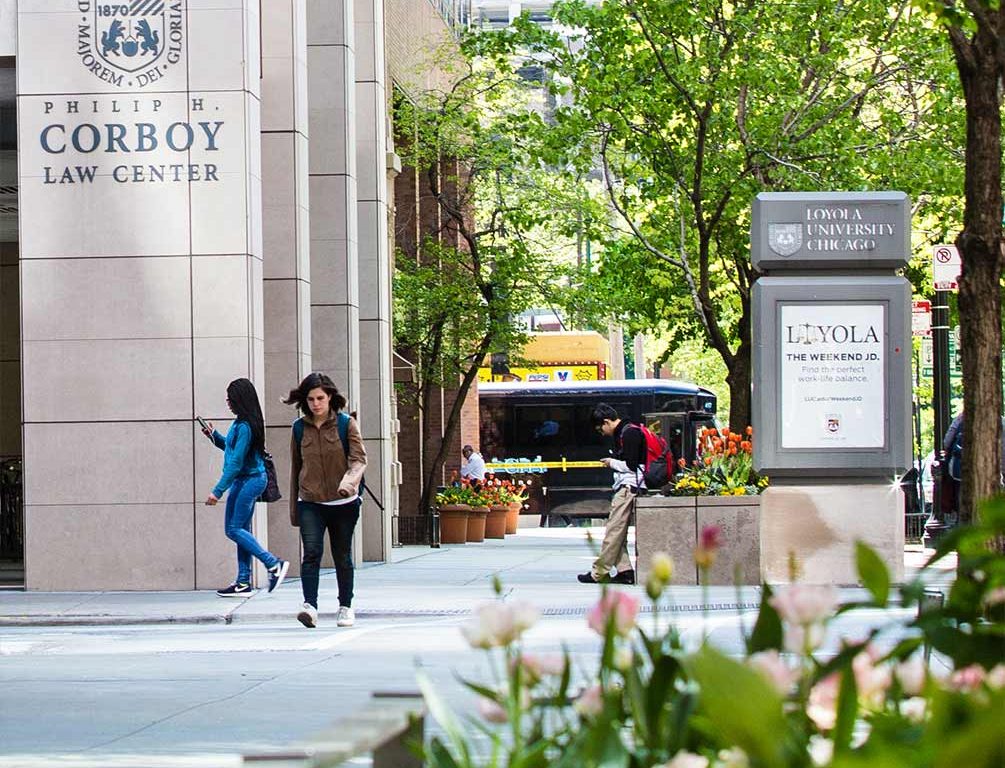I have loved my experience taking IP classes at Loyola. My first post actually discussed how my interest in IP grew. My second post was about fun facts related to IP. My third post discussed patented pet products. I have been able to focus on everything that I love: from IP to pet-related products!
Currently, I am taking my third IP-related course. The course is called the Intellectual Property Colloquium, and it is jointly sponsored and taught by both the Chicago-Kent College of Law and the Loyola University Chicago, School of Law. The course is generally taught in the Spring semester by faculty from Loyola and Kent. This year’s faculty are Edward Lee, Graeme B. Dinwoodie, Greg Reilly, Cynthia Ho, and Matthew Sag. As noted in my first post, I love taking classes taught by Professor Ho.
IP Colloquium: General Information
The course has a unique format that I enjoy, and I am fascinated by everything that I have learned in this class that builds upon, yet is different than prior classes. The course is focused on discussing works-in-progress rather than focusing on reading a book like traditional law school classes. My favorite part is learning about new topics and getting to ask questions from experts in the field!
In order to be eligible to participate in the Colloquium, students have to apply and be chosen as Colloquium fellows. After the completion of the Colloquium, students at Loyola receive one graded credit. As part of the course, students have the opportunity to read papers in progress and hear lectures by six invited professors on the papers.
My Experience in the Class
I first heard about this class from Professor Ho when she mentioned it in the Fall IP survey class. The class was unlike any other class that I have taken in law school. All of my other classes involved lectures and cold calls. This class instead would allow me the opportunity to interact with scholars from around the country who write about IP law. I found the format interesting, and I heard great things from students who had taken it before.
I have really enjoyed reading different types of articles by well-known experts in the field of IP law, often on issues that are not discussed in other classes. For example, one article discusses writs of mandamus in the context of patents. After we read the papers, we have a chance to all get together in class and discuss that week’s reading. We go over the thesis of the paper, discuss some of the main points in more detail and ask any questions that we might have related to the article.
Then, during the upcoming week, we write a reflection paper and give suggestions and feedback to the author. We also include any questions that we might have for them. Then, we have a chance to meet with the author to learn more about their article, usually in the form of a mini-lecture. We then have the opportunity to ask the authors questions, in light of our feedback.
Paper#1: Transition from Copyright to Trademark and Right of Publicity Protection
The first paper we read was written by Professor Kevin J. Greene and was titled “Goodbye Copyright?: The Rise of Trademark and Publicity Rights in the Hip-Hop Music Industry.” This paper was in article format. The paper analyzed the transition of hip hop artists from seeking copyright protection (on expressive works) and generating revenues through copyrights to producing more revenue via the use of trademarks (that protect words and images) and the domain of right of publicity (that protects someone’s name, likeness and recognizable aspects). It also discussed how African American hip hop artists were the most affected by this.
I did not know much about this topic before reading this paper, and I found it fascinating. Dr. Greene’s discussion was incredibly captivating and hearing about his experience of working with celebrity artists was impressive. He discussed how complex and sometimes unfair the music industry can be to new artists and ways in which that could be improved. The topic and Dr. Greene’s charisma made this one of my favorite presentations.
Paper #2: Patents and Vaccines
The next paper we read was written by Professor Ana Santos Rutschman,titled Aligning Vaccine Innovation with Public Health Needs.” The paper was one of the chapters of a forthcoming book that Professor Santos Rutschman is planning to publish. Given my interest and fascination with patents, I found the paper especially interesting. Because I am particularly interested in global access to medicine, I loved Professor Rutschman’s article which dealt with vaccine access.
The book chapter examined possible solutions in ensuring access to vaccines for lower-income countries and in creating vaccines. The author proposed that solutions included offering non-intellectual property (IP) incentives such as grants and prizes. The author also discussed using patent pools (as a way to easily share multiple patents) and patent pledges (pledges by patent owner not to sue certain actors for ingfringement) to facilitate transferring of vaccine technology. Finally, it proposed having public-private partnerships (between industry and govenrments) that promote equitable access to vaccines. I was able to better understand this paper since I took Professor Ho’s Global Access to Medicine class last year.
Professor Santos Rutschman’s discussion of the book chapter was informative. She first explained vaccine production and innovation and how IP affects both of those things. She then went on to discuss the chapter and answered our questions. The proposal of having patent pools with a specific requirement was the most interesting part of the article for me. The requirement would be that every country that would have leftover vaccines would be expected to donate them to low-income countries.
Paper#3: Class Actions and Copyrights
We then read “Copyright Class Actions and Blanket Licensing by Litigation” by Professor Xiyin Tang. This paper analyzed how class action (special method for many plaintiffs to sue) copyright suits have been used as a licensing scheme and at the same time have influenced substantive copyright law. Before reading this paper, I had never considered class action suits as a tool that could be used in the world of IP law.
Professor Tang explained that I wasn’t alone. In fact, many other scholars had not really thought of this specific use of copyright class actions. She discussed in detail how class actions can address the rising transaction costs that having millions of new creators created related to licensing. In her paper, she also mentioned several significant class actions that have dealt with copyright. One of them was the Google Books class action suit. In that case, the court found that the Google use of the books was considered to be fair use, which means that Google was not infringing. On the other hand, in the Spotify lawsuit, the parties were actually able to enter into a settlement which Professor Tang explores in more detail in her paper.
There are still three more papers that we have to read and discussions with the authors that we have to attend. I cannot wait to learn more about fun topics in the IP world. I am looking forward to reading them and hearing the authors’ discussions. I have loved the course so much that I hope to take it again next spring. The nature of the course (having new papers each year) affords students the opportunity to take it again. I hope to see you all in the class in the Spring of 2023!

Doris Cikopana
Associate Blogger
Loyola University Chicago School of Law, J.D. 2023
